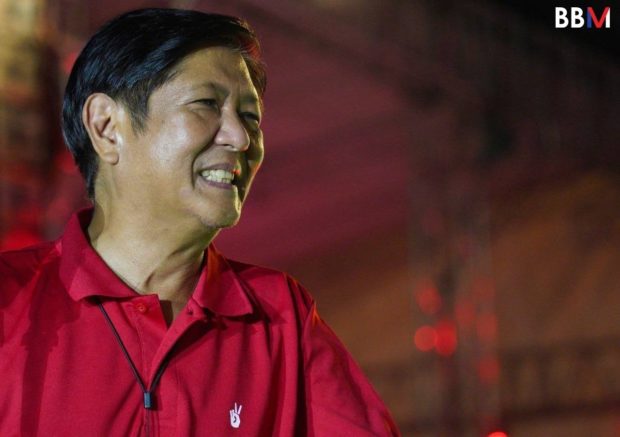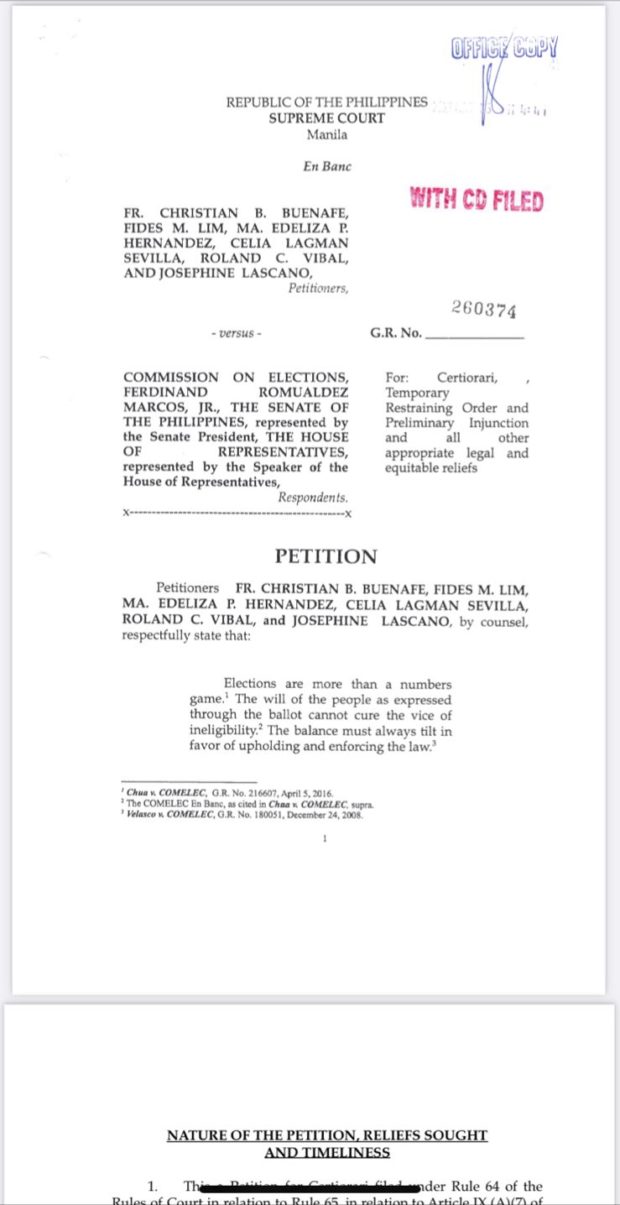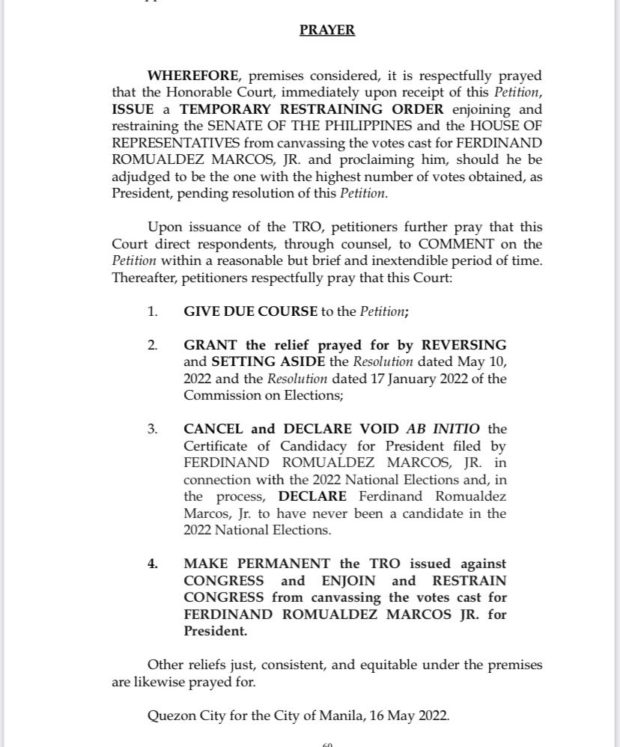Petition to reverse Comelec decision on Bongbong Marcos’ DQ case reaches SC
MANILA, Philippines — Civic leaders on Tuesday have asked the Supreme Court to stop the Senate and House of Representatives from canvassing the votes cast for former senator and presumptive president Ferdinand “Bongbong” Marcos Jr.
The prayer for a restraining order was contained in a petition to reverse the decision of the Commission on Elections (Comelec) dismissing the bid to cancel Marcos’ certificate of candidacy (COC).
“The injunctive relief sought is clearly urgent. Petitioners respectfully ask this Court to act without any delay in considering this application,” the petition stated.
The petitioners were referring to the Comelec’s January 17 resolution and Comelec’s en banc ruling dated May 10.
Article continues after this advertisementThe Senate and House of Representatives will convene on May 23 to canvass the votes cast for President and Vice President.
Article continues after this advertisement‘Only remedy available’
In their petition before the high court, the petitioners said: “A temporary restraining order is the only remedy available to enjoin and restrain the Congress of the Philippines from rendering this Petition moot and, in the event this Court rules in favor of the petitioners, allowing a candidacy that should never have been to ripen into a presidency of an ineligible candidate.”
If the SC would grant their petition for a restraining order, they said it can exclude only the votes cast for Marcos Jr., leaving the unaffected votes for the other candidates.
“It is not petitioners’ desire to impede the Congress of the Philippines from performing its constitutional duty; it is rather petitioners’ desire to ensure that Congress, in performing this duty, does not end up performing it in vain,” petitioners said.
The case
A complaint was filed against Marcos before a Quezon City court for violating the National Internal Revenue Code. Specifically, Marcos was sued for breaching the 1977 Internal Revenue Code as he failed to file income tax returns (ITRs) from 1982 to 1985 and did not pay the income taxes due.
In 1995, the Quezon City court found Marcos guilty and imposed nine years imprisonment as a penalty. The court also directed Marcos to pay a fine for his failure to file his ITRs and pay the taxes due. The case was elevated to the Court of Appeals.
Two years later, the Court of Appeals affirmed the lower court’s ruling and ordered Marcos to pay the deficiency income taxes due with interest, a total of P36,000 fine for non-filing of income tax returns from 1982 to 1985.
Marcos took the case to the Supreme Court but eventually withdrew it, making the decision of the Court of Appeals final and executory.
2022 presidential elections
Marcos filed his COC to run for president in the 2022 elections. In his COC, he declared that he is eligible to run for President of the Philippines and he answered “no” to the question if he has been found liable for any offense, which carries the penalty of perpetual disqualification to hold public office.”
Last January, the Comelec dismissed the petition to cancel Marcos’ COC, saying the Court of Appeals affirmed Marcos’ conviction to file income tax returns but not for failure to pay taxes. The Comelec also said that the Court of Appeals did not specifically mention that Marcos is perpetually disqualified from holding public office.
The Comelec added that the 1977 Internal Revenue Code does not require mandatory prison time and does not impose automatic perpetual disqualification to hold public office for offenders.
The Comelec en banc affirmed the January ruling of a poll body division, prompting petitioners to take the case to the Supreme Court.
Arguments before the Supreme Court
The petitioners said Comelec committed grave abuse of discretion when it refused to cancel Marcos’ COC, which is actually void from the beginning.
“With Marcos, Jr.’s void COC, the eligible candidate with the next highest number of votes should be proclaimed,” read the petition.
The petitioners also asserted that the Comelec has excluded Marcos from the coverage of the 1977 tax code. They explained that the Court of Appeals did not explicitly mention that Marcos is perpetually disqualified from holding public office “because the Court of Appeals did not have to do so.”
Section 286 of the Tax Code states that “any person convicted of a crime penalized by this (NIRC) Code shall, in addition to being liable for the payment of the tax…if he is a public officer or employee…he shall be dismissed from the public service and perpetually disqualified from holding any public office, to vote, and to participate in any election.”
“Thus, by operation of law, and regardless of whether such disqualification was expressly directed in the judgment of conviction, the consequence of perpetual disqualification is deemed imposed upon the final conviction of Respondent Marcos Jr.,” the petitioners said.
The petitioners also cited the case of Romeo Jalosjos Sr., where a high court ruling states that disqualification under the law “is deemed part of the final judgment of conviction. In fact, perpetual special disqualification takes effect immediately once the judgment of conviction becomes final.”
On the question of whether Marcos was a public officer or not when the supposed tax offense was committed, Comelec’s 2nd division said Marcos was not. This was later affirmed by the Comelec en banc.
The Comelec’s decision in January cited the case of Republic vs. Sandiganbayan as its basis for saying that Marcos was no longer a public officer upon his departure for Hawaii in 1986, the last day for him to file the ITR for the taxable year 1985.
Comelec said Marcos’ departure is deemed as an abandonment of his post as governor of Ilocos Norte.
But the petitioners asserted that the same ruling mentioned Provisional Constitution which provides that “all elective and appointive officials and employees under the 1973 Constitution shall continue in the office until otherwise provided by proclamation or executive order…”
Besides, the petitioners added, Marcos himself did not deny the allegation that he was a public officer during the questioned year.
SC action
The high court is currently on a decision-writing break but under its rules, the case will be raffled to a justice-in-charge.
The justice-in-charge can recommend to the Chief Justice an action on the petition specifically on the plea for a temporary restraining order. If approved, a restraining order may be issued.
However, it would immediately be subject to confirmation by the Court en banc (full court). If confirmed, the restraining order will be enforced.
RELATED STORIES
Comelec division junks petition to cancel Marcos COC for president
Congress canvassing of votes for president, VP to begin May 24


